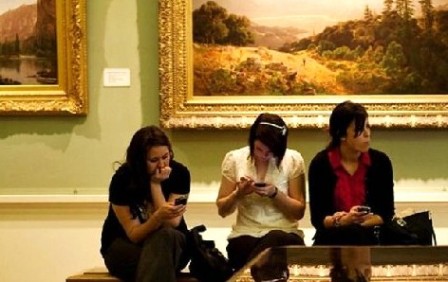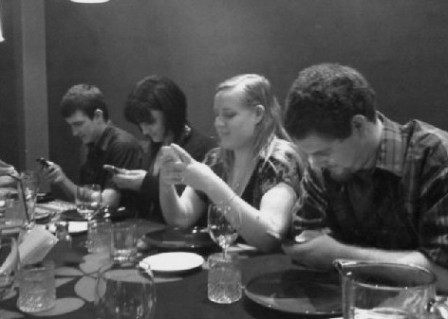Real Social Interaction Is on its Deathbed: Part I

NEWS JUNKIE POST
Jul 22, 2012 at 9:15 am Instead of bringing us together, social media through computers, smart phones, tablets, and all mobile devices is creating a great divide among people. Anyone who wants to communicate in person is fast becoming a minority. More people love their machines than they do other people. These devices are a convenient moat separating people from human contact. Machines help them escape into a world where they feel safe and where other humans increasingly play a secondary role. Human contact in today’s world is fast becoming a memory.
Instead of bringing us together, social media through computers, smart phones, tablets, and all mobile devices is creating a great divide among people. Anyone who wants to communicate in person is fast becoming a minority. More people love their machines than they do other people. These devices are a convenient moat separating people from human contact. Machines help them escape into a world where they feel safe and where other humans increasingly play a secondary role. Human contact in today’s world is fast becoming a memory.
I first noticed something amiss when in Paris some years ago I watched four people sit down at a table near me at an outdoor café. They were young, probably in their twenties, nicely dressed and chatting away happily. As they sat, each took from their pocket a cell phone and placed it in the middle of the table where they were sitting. I thought for a moment that the phones were going to talk to each other without the help of their owners, thus bypassing any human connection.
I finished my coffee and when I got up to leave, I noticed that each person was either talking on their phone or manipulating the keys in some fashion, ignoring the person next to him or her. I thought that the four people hardly knew they were with each other. The only thing they had in common was a cell phone.
In New York each morning I ride the elevator from my 11th floor apartment on my way to work. In that moving box I watch the people in it staring at their smart phones as if their lives depended on whatever they were seeing on the phones small screen. I see their fingers moving rapidly over the phones tiny keys as they send text messages or seek more information from whatever Web site they are visiting.
Over many weeks observation, I even noticed what seemed or be couples, husbands and wives or significant others, busily staring at their phones instead of looking at each other. Did they ever hold hands? Did they touch as lovers might? I wondered what life was like for them behind closed doors when they were home again together for the evening. I hope that life on the living room couch or in the matrimonial bed is far more interesting than the words and pictures social media and the Internet are presenting to them.
In a restaurant last week, a family of five sat next to my companion and me. They were tourists in New York on vacation. They sat down, hastily viewed the menu, and made up their minds what to order. Then each pulled out a smart phone or a tablet. The youngest, a girl perhaps ten, started to text her friends – I could tell what she was doing by how rapidly her fingers moved across the keyboard. None of those at the table, including the parents, said anything to anyone else sitting there. So it goes.
Now take a hard look at the photos that are an important part of this essay. A friend gathered them from the Internet and sent them to me. The set’s title is “Hanging Out.” If you can see the faces of the young people and if you can watch their eyes, you may recognize that they only have eyes for the small instrument in their hand, never looking at or seeing anyone next to them, across from them, or near them.
These photos serve as an example of how everything outside the self has no meaning and does not exist, especially if you are young. Increasingly it seems that personal existence and even survival depends on the need for face-to-face social intercourse.
At one time, a long ago, the earliest known people sat around campfires or inside caves and grunted or talked as they described their day, vented their frustrations, reveled in something new, or were sad over a an unhappy event. Without saying it, people understood the importance of each other in what has become a cliché, the family of man. I believe that is quickly disappearing. Interacting with real people is still healthy. I am not sure how healthy it is to have an inanimate phone as one’s bosom companion. Are we really social animals? Is the collective ruling our lives? Do the new machines we create, as I believe, now control us? Only time will tell.
Related Articles
- June 5, 2011 Does Our Hyper-Connected World Make People Socially Inept?
- January 25, 2014 From Analog to Digital: The Revolution Against the Patriarchal World Order
- July 31, 2012 Wired But Disconnected
- September 15, 2012 Data Mining: The Price to Pay for Our “Free Parking” in Cyberspace
- July 7, 2014 Spin and Self Delusion: Ignorance Is Bliss
- April 27, 2012 Want to Lose All Privacy and Personal Security? There’s Apps For That

















3 Responses to Real Social Interaction Is on its Deathbed: Part I
You must be logged in to post a comment Login